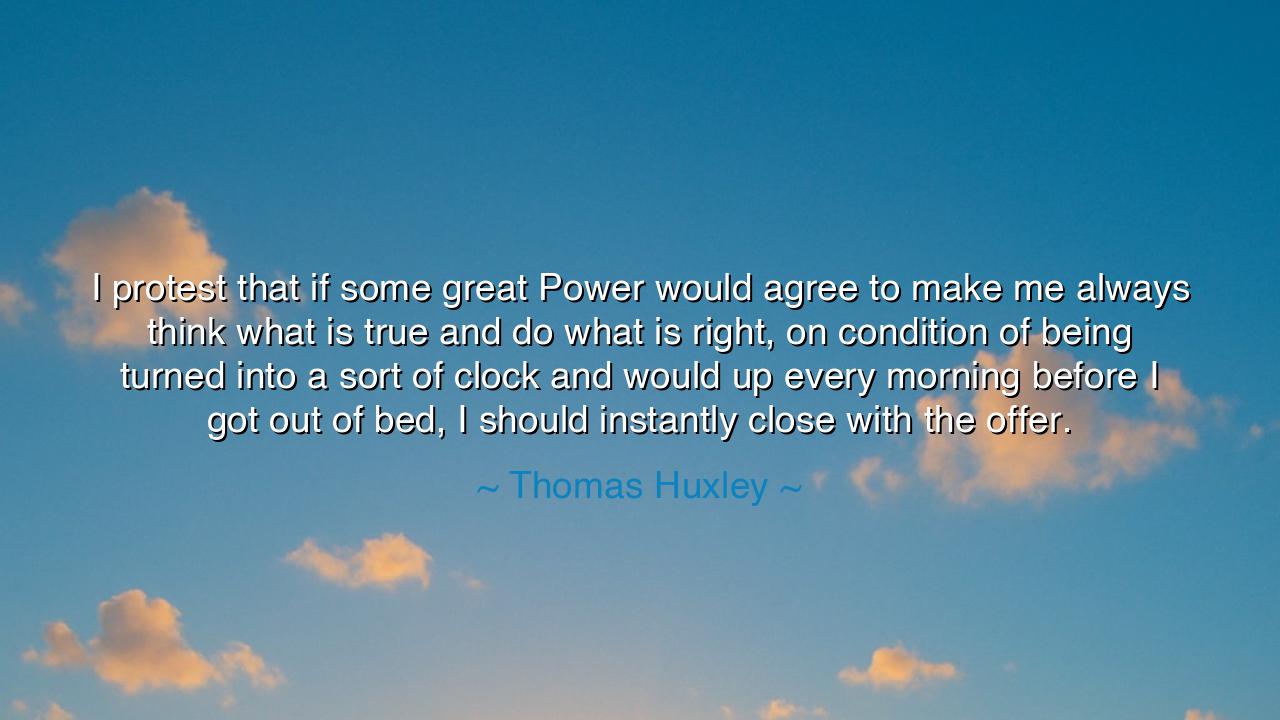
I protest that if some great Power would agree to make me always
I protest that if some great Power would agree to make me always think what is true and do what is right, on condition of being turned into a sort of clock and would up every morning before I got out of bed, I should instantly close with the offer.






Hear the words of Thomas Huxley, the great defender of Darwin and the man once called “Darwin’s Bulldog,” who declared: “I protest that if some great Power would agree to make me always think what is true and do what is right, on condition of being turned into a sort of clock and wound up every morning before I got out of bed, I should instantly close with the offer.” These words, half in jest and half in longing, reveal the eternal struggle of humankind: the desire for certainty, the yearning to be unfailingly virtuous, and the recognition of how often we fail in both.
For Huxley knew the burden of human freedom. To be human is to dwell in uncertainty, to wrestle daily with the question of what is true, and to stumble often when striving for what is right. He imagined a Power that could take away this burden, winding him like a clock so that he might act and think with flawless correctness. In this, we see not weakness, but the cry of one who understood the weight of choice. How much simpler life would be if every action were already aligned with justice, every thought already aligned with truth! Yet in this longing, Huxley also reveals the paradox of human greatness: for it is precisely our struggle, not our certainty, that shapes us.
The ancients also pondered this question. Plato spoke of the philosopher-king, who would see the eternal Forms and govern always with wisdom. But he too knew that few, if any, could live such a life of pure clarity. Marcus Aurelius, the Stoic emperor, rose each morning exhorting himself to be upright, truthful, and just, yet confessed in his meditations that he often faltered. Huxley’s imagined bargain with fate reflects the same yearning of the ancients: to escape the burden of failure, to live in unbroken harmony with truth.
Consider also the story of Saint Augustine. Before his conversion, he prayed, “Lord, make me chaste—but not yet.” He knew what was right, but he was not yet ready to embrace it. His confession is the mirror of Huxley’s thought: if only there were a power to guide us without wavering, to align our will perfectly with virtue, how gladly we would accept it! And yet, history shows that the saints, the sages, and the wise are formed not by the absence of struggle, but by passing through it.
Huxley’s use of the clock is telling. A clock is regular, dependable, predictable, wound each day to fulfill its function without fail. To be such a mechanism is to be free of temptation, free of error, free of hesitation. But it is also to be free of freedom itself. Would we be fully human if we were reduced to such machinery? Or is it in our faltering, in our striving, in our victories over weakness that our humanity finds its highest expression? Huxley himself, though wishing for such certainty, lived a life of fierce debate and searching, proving that the yearning for perfection need not lead to passivity but to relentless striving.
The lesson, then, is this: while the thought of being wound up like a clock, flawless in truth and righteousness, is comforting, we must remember that the true path of humanity is forged in uncertainty. To seek the true and the right is our task, not because we will always succeed, but because the striving itself ennobles the soul. If a Power does not wind us each morning, we must wind ourselves—with discipline, with reflection, with courage—so that each day begins with renewed commitment to virtue.
Practically, take Huxley’s yearning as your guide. Each morning, before the rush of the day, pause as though being wound like a clock. Set your intention: to seek truth in your words and actions, to strive toward what is right even in small things. Accept that you will falter, but let each failure drive you to begin again. In this way, though you are not a perfect mechanism, you may yet live a life of deliberate rhythm, steady purpose, and moral strength.
And so, O listener, remember: the gods may not grant you the certainty of a wound-up clock, but you hold in your own hands the power to seek, to strive, and to rise anew each day. Do not despise the struggle, for it is the forge of wisdom. Embrace the uncertainty, for in wrestling with it, you grow. And in this way, though imperfect, you will live as one who honors truth and walks steadfastly toward the light of what is right.






AAdministratorAdministrator
Welcome, honored guests. Please leave a comment, we will respond soon